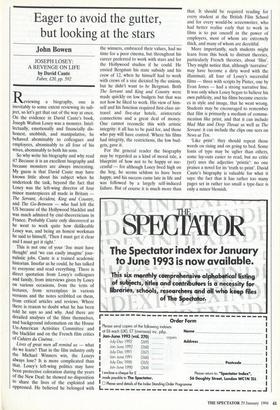Eager to avoid the gutter, but looking at the stars
John Bowen
JOSEPH LOSEY: A REVENGE ON LIFE by David Caute Faber, .£20, pp. 592 Reviewing a biography, one is inevitably to some extent reviewing its sub- ject, so let's get that out of the way at once. On the evidence in David Caute's book, Joseph Walton Losey was a monster. Intel- lectually, emotionally and financially dis- honest, snobbish, and manipulative, he behaved abominably to colleagues and employees, abominably to all four of his wives, abominably to both his sons.
So why write his biography and why read it? Because it is an excellent biography and because monsters are always interesting. My guess is that David Caute may have known little about his subject when he undertook the task, beyond the fact that Losey was the left-wing director of four minor masterpieces all made in Britain The Servant, Accident, King and Country, and The Go-Between — who had left the US because of the Hollywood blacklist and was much admired by eine-theoreticians in France. Probably Caute only discovered as he went to work quite how dislikeable Losey was, and being an honest workman he said to himself, 'Then I must get it clear and I must get it right.'
This is not one of your 'Joe must have thought' and 'we can easily imagine' jour- nalistic jobs. Caute is a trained academic historian. Insofar as he could, he has talked to everyone and read everything. There is direct quotation from Losey's colleagues and family, from interviews given by Losey on various occasions, from the texts of lectures, from screenplays in various versions and the notes scribbled on them, from critical articles and reviews. Where there is reason to doubt what he has been told he says so and why. And there are detailed analyses of the films themselves, and background information on the House Un-American Activities Committee and the blacklist and on the French film critics of Cahiers du Cinema.
Lives of great men all remind us — what do we learn? That in the film industry only the Michael Winners win, the Loseys always lose? It is more complicated than that. Losey's left-wing politics may have been protective coloration during the years of the New Deal: he showed no disposition to share the lives of the exploited and oppressed. He believed he belonged with the winners, embraced their values, had no time for a poor cinema, but throughout his career preferred to work with stars and for the Hollywood studios if he could. He envied Bergman his state subsidy and his crew of 12, when he himself had to work with crews of a size dictated by the unions, but he didn't want to be Bergman. Both The Servant and King and Country were made quickly on low budgets but that was not how he liked to work. His view of him- self and his function required first-class air- travel and five-star hotels, aristocratic connections and a great deal of money. One cannot reconcile this with artistic integrity: it all has to be paid for, and those who pay will have control. Where his films had integrity, the restrictions, the low bud- gets, gave it.
For the general reader the biography may be regarded as a kind of moral tale, a blueprint of how not to be happy or suc- cessful — for although Losey lived high on the hog, he seems seldom to have been happy, and his success came late in life and was followed by a largely self-induced failure. But of course it is much more than that. It should be required reading for every student at the British Film School and for every would-be screenwriter, who had better realise early that to work in films is to put oneself in the power of employers, most of whom are extremely thick, and many of whom are deceitful.
More importantly, such students might learn from this book to distrust theories, particularly French theories, about 'film'. They might notice that, although 'narrative' may have become a dirty word with the illuminati, all four of Losey's successful films — three with scripts by Pinter, one by Evan Jones — had a strong narrative line. It was only when Losey began to believe his own publicity, and his films became exercis- es in style and image, that he went wrong. Students may be encouraged to remember that film is primarily a medium of commu- nication like print, and that it can include Mad Max and Deep Throat as well as The Servant: it can include the clips one sees on News at Ten.
'Like print': they should repeat those words on rising and on going to bed. Some fonts of type may be uglier than others, some lay-outs easier to read, but no critic (yet) uses the adjective 'printic': no one praises a novel for its 'truth to print'. David Caute's biography is valuable for what it says: the fact that it has rather too many pages set in rather too small a type-face is only a minor blemish.


































































 Previous page
Previous page